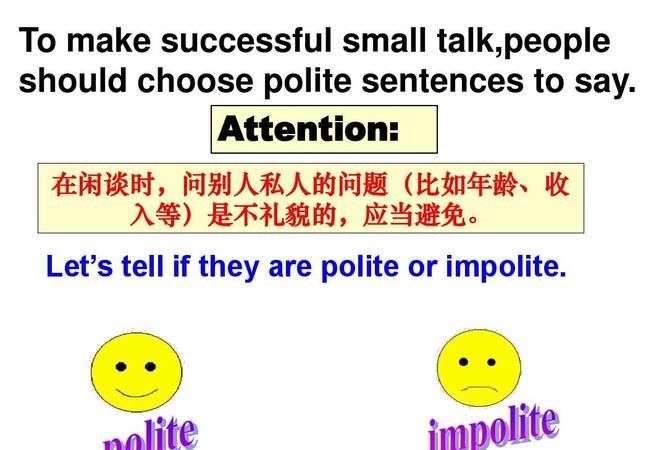本文目录
在英文书信中说收到
除非有将来的时间要用一般将来时外,其它用一般现在时态较好。
例如: Will you go to see your English teacher next Sunday with me?
What do you think about my article on sports? ( 无将来时间)

英语口语:表达意见的4种方式
实用英语口语:表达意见的14种方式
生活中,经常有人会询问我们的意见,或者在某些情况下,即使没有被询问,我们也会给出自己的意见。下面是我为大家带来的英语口语表达意见的方式的知识,欢迎阅读。

英语口语表达意见的方式
In life we’re often asked to give our opinion, or in some cases, we give our opinion even if it hasn’t been asked for!
生活中,经常有人会询问我们的意见,或者在某些情况下,即使没有被询问,我们也会给出自己的'意见。
Sometimes we can be very direct with our opinion and it won’t upset the other person. However, more often than not we need to be careful how we share our thoughts so as not to offend or hurt the other person’s feelings. This can be especially true in business where cultural differences can have a detrimental effect on business dealings.
有时我们可以非常直接地表达我们的意见,且不会让别人不开心。但是,为了不伤害或冒犯到他人,我们通常需要小心翼翼的分享我们的想法。这在商界尤其重要,因为文化差异可能会对交易产生不利影响。
The British are especially careful when giving their opinion (in business, that is). They often don’t want to cause offence and consequently, will start their sentences using certain expressions to soften the blow. A number of my clients have said that the British are very polite and considerate in their dealings with colleagues and clients. So much so, that the British way of doing business is often admired.
英国人在表达自己的意见时特别小心(在商界)。他们通常不想冒犯别人,所以开始会使用一些特定的表达来缓和接下来的内容。我的顾客中有很多人都说过英国人在和同事及顾客处理问题时都非常地礼貌和体贴。所以,英国人做生意的方式通常都是令人钦佩的。
In this post, I’d like to share with your some common expressions we have of giving one’s opinion. I have used Liz Potter’s excellent article for Macmillan Dictionary’s blog as the main structure and made some changes to it.
在这篇文章中,我想分享一些在表达意见时会用到的常用词组。我用Liz Potter为麦克米伦字典的博客写的一篇优秀文章作为主要结构,并做了一些改动。
1. I think
This is the most common and general way of giving an opinion. You can use it both informally and formally: I think if you offer a consistently good service to your clients, they will keep coming back to you.
这是最常用、最普遍的表达意见的方式,正式和非正式情况下都可以使用:我认为如果你给客户提供始终如一的优质服务,他们会一直选择你们的服务。
2.I reckon
This is a more informal way of giving your opinion: I reckon it will be much faster to get to London by train.
一种更加非正式的表达意见的方式:我认为坐火车去伦敦会更快。
3. In my opinion (4) In my view
These expressions are more formal and are often used when talking about important issues:
In my view, they made a huge mistake in not selling the company when they had the chance.
In my opinion, the Bank of England should not raise interest rates this year.
这两个表达更加正式,并且通常在谈论重要问题时使用:
在我看来,当他们有机会卖掉公司时却不卖是个重大的错误。
在我看来,英国银行今年不应该增加利息。
5. It seems to me (6) All things considered
When you’ve thought about a situation carefully you could use either of these two expressions:
It seems to me that they are spending more money than they need to to attract new talent into the company.
All things considered, I think we made a wise choice in recruiting James.
当你已经仔细考虑过一种情形时,你可以使用两种表达中任意一种:
在我看来,在为公司引进新人才时,他们的花费比实际需求多很多。
总的来看,我认为招聘詹姆斯是一个明智的选择。
7. If you ask me
This is used when your opinion is critical. Sometimes, people say this even when their opinion hasn’t been asked for! – “If you ask me,…..” “But I didn’t ask you….!”
If you ask me, she has spoilt her children far too much.
当你的意见带有批评性质的时候使用这种表达。有时,人们甚至会在没有被询问意见的时候使用这个短语!-“依我看…”“但是我没有问你…”!
依我看,她太过溺爱她的孩子了。
8. To be honest (9) To tell you the truth (10) To be frank:
All three expressions are a way of giving your opinion when you know that people may not like what you have to say:
To tell you the truth, your father was right when he said that you undersold the company.
To be honest, I preferred it when you were blonde.
To be frank, I thought her acting was simply terrible.
知道别人可能不喜欢你要说的话时,可以用这三种表达来给出你的意见:
老实告诉你,你父亲对你低价抛售公司的判断是对的。
老实说,我更喜欢你金发的样子。
坦白地说,我觉得他的表演很糟糕。
11. Frankly speaking
You would use this expression to give your opinion in a more familiar and forthright way.
Frankly speaking, I don’t know what she sees in him.
这是一种更亲近和直率的表达意见的方式:
坦白地说,我不知道她看上他哪一点。
12. Personally
This is used to emphasize that you are giving your own opinion:
Personally, I think the CEO should apologize for his appalling behavior at the shareholders’ meeting.
这个短语通常用来强调你说的只是个人意见:
就我而言,我认为总裁应该为他在董事会的恶劣行为道歉。
13. To my mind (14) As far as I’m concerned
When you realize that other people may not agree with you, you would use either of these expressions:
To my mind, private education is better than state education.
As far as I’m concerned, tennis is a much more interesting sport than football.
当你意识到其他人可能不同意你的观点时,可以使用这两种表达中的任意一种:
依我看,私立教育比公立教育好。
就我而言,网球比足球有意思多了。
So there you have it! You have 14 ways to give your opinion in English. Which expressions are you likely to use?
都学会了吧!一共14种用英语表达意见的方式,你喜欢用哪一种呢?
;如何用英语礼貌的询问别人的名字
This test isn’t that important. Don’t take it to heart.4. We’d better be off. 我们该走了。It’s getting late. We’d better be off .5. Let’s face it. 面对现实吧。常表明说话人不愿意逃避困难的现状。参考例句:I know it’s a difficult situation. Let’s face it, OK?6. Let’s get started. 咱们开始干吧。劝导别人时说:Don’t just talk. Let’s get started.7. I’m really dead. 我真要累死了。坦诚自己的感受时说:After all that work, I’m really dead.8. I’ve done my best. 我已尽力了。9. Is that so? 真是那样吗?常用在一个人听了一件事后表示惊讶、怀疑。10. Don’t play games with me!别跟我耍花招!11. I don’t know for sure.我不确切知道。Stranger: Could you tell me how to get to the town hall?Tom: I don’t know for sure. Maybe you could ask the policeman over there.12. I’m not going to kid you.我不是跟你开玩笑的。Karin: You quit the job? You are kidding.Jack: I’m not going to kid you. I’m serious.

如何用英语礼貌拒绝
微笑的确是非常重要的。微笑比起任何谦逊的措辞都更能够使你显得更加礼貌。如果你展现出了使人安心的微笑,你可以询问更加私人和不便的问题,下面举几个例子。
当你询问一些信息时
Excuse me, *smile* could you tell me where the exit is?【打扰一下,(微笑)请问您能告诉我出口在哪儿吗?】
Excuse me, *smile* do you have the time?【打扰一下,(微笑)请问您有时间吗?】
Excuse me, *smile* where could I find a restroom?【打扰一下,(微笑)请问洗手间在哪里?】
Excuse me, *smile* where would I find the nearest hotel?【打扰一下,(微笑)请问最近的旅馆在哪里?】
Excuse me, *smile* I'm looking for The Great Gatsby.【打扰一下,(微笑)请问《了不起的盖茨比》被放在哪里?】
请求
I'm sorry, *smile* could you please sign here?【打扰一下,(微笑)请问您能在这儿签名吗?】
*smile* Would you please let me know when she arrives?【(微笑)请问您能告诉我她什么时候到吗?】
Could you please call me back when it's convenient? (You're probably on the phone, but you could smile anyways to make yourself feel happier.)【请问您能告在方便的时候回电给我吗?(你或许正在打电话无法让对方看到你正在微笑,但是你依然可以微笑,这会让你自己的语气更友善)】
Excuse me, *smile* is this seat taken?【打扰一下,(微笑)请问这个位置有人了吗?】
Excuse me, *smile* do you mind if I use/borrow/take this? (In this case, you are asking if the person would object, so "No" = "No, I don't mind" = "Yes, go ahead")【打扰一下,(微笑)请问您建议我使用/借用/拿走这个吗?(在某些情况中如果你在询问时如果他拒绝了,或许他的意思是“不=不,我不介意=可以,那去吧”)】 (此处可能有翻译错误,望指正)
Excuse me, *smile* Professor Lawrence, I injured my writing hand yesterday. I was wondering if I could have some extra time on tomorrow exam? I have a doctor's note here.【打扰一下,(微笑)劳伦斯教授,我昨天写字的手受伤了,关于明天的考试,我想您是否能给我调整一下时间,这是我的医生处方】
*smile* May I go to the bathroom? (This is a pet peeve of many middle school teachers. A student usually asks, "Can I go to the bathroom?" and the teacher might respond sardonically, "I don't know. Can you?" which implies that the student does not have the ability to go to the bathroom.)【(微笑)我可以去洗手间吗?(此处有一个经常受中学老师抱怨的问题。学生经常会问“我可以去洗手间吗”而老师通常会讽刺性地回答“我不知道,你觉得你可以吗?”事实上暗示了学生不应该在课堂上去洗手间。)】
当你想要多了解一个人时,你或许会问这些问题
对于这些更加私人化的问题,我建议您问间接性的广义的问题,使得被询问者可以自由地回答。在他/她讲述自己故事的过程中,您或许能够了解想要了解他的信息。
*smile* I hope I'm not intruding, but could you tell me about your childhood?【 (微笑)我希望我没有冒犯您,但是请问您能告诉我关于您童年的一些事吗?】
Actually hoping to know,【事实上提问者希望了解以下信息】
When was the person born?【被询问者是什么时候出生的】
Where was the person born?【被询问者在哪里出生】
Where did the person grow up?【被询问者是什么地方长大的】
Does the person have any siblings?【被询问者有什么兄弟姐妹】
What kind of people are her or his parents?【被询问者的父母是哪种人】
Was the person a good student?【被询问者是一个好学生吗】
If you don't mind me asking, *smile* what do you think about love?【如果您并不介意的话(微笑)请问您对“爱”有什么理解?】
Actually hoping to know,【事实上提问者希望了解以下信息】
Is the person single?【被提问者是单身吗?】
Is the person interested in a relationship?【被提问者对恋爱有兴趣吗?】
What kind of past relationships did she or he have?【并询问着的上一段恋爱经历是怎么样的】
如何开始一段对话
Excuse me, *smile* which book are you reading? It looks really interesting!【不好意思(微笑)你正在看哪本书?它看起来很棒!】
Wow, *smile* that's a great shirt! Where did you get it?【喔!(微笑)这件衬衫看起来好赞,你从哪里买的?】
在所有的这些问题前,你都可以添加一段朋友间的问候
A: Hi, how are you?【嗨,你过得怎么样】
B: Great, how are you?【不错,你呢】
A: Excellent! I'm staying here for a couple days and I was wondering if you could recommend some fun things to do around town?【很棒,我会在这儿呆几天,你能告诉我这周边有什么好玩的东西吗?】

以上就是关于礼貌询问别人建议的英文,在英文书信中说收到的全部内容,以及礼貌询问别人建议的英文 的相关内容,希望能够帮到您。

